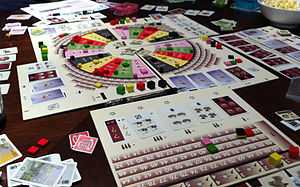SPIR608 Political Simulations and Gaming

| | Resource type: this resource is a course. |
SPIR608 Political Simulation and Gaming is BA Politics Level 6 Core Module at the University of Westminster
- The module will be running for the first time in January - April 2011.
- For current course
- January - April 2013
This module is being run in conjunction with the Department of Board Game Design.
- Module Leader: Dr. Richard Barbrook
This is a module which combines the theoretical analysis of political gaming with the critical analysis of playing political simulations.
Module Aims
This module aims to:
- introduce students to the techniques of political gaming and simulation;
- examine the history of games and simulations for political modeling;
- critically analyse the technical mechanisms and ideological assumptions of political games and simulations;
- critically analyse the cultural and political theories of gaming and simulation.
Learning Outcomes
On successful completion of the module students will be able to:
- understand the history of political games and simulations;
- apply a variety of theoretical approaches to analyse political games and simulations;
- assess the effectiveness and credibility of different types of games and simulations to model historical and contemporary political struggles and international conflicts;
- use both written and oral skills to analyse the theories and practices of political games and simulation;
- create a prototype of a game or simulation to model political struggles and international conflicts.
Indicative Syllabus Content
This module critically analyzes political gaming and simulations from both a theoretical and practical perspective. It involves lectures, game playing, workshops and tutorials.
The lectures provide an overview of the historical development of political gaming and the different theoretical approaches which can be used to critically investigate these simulations. These insights will be used by the students to write a reflective practice analysis about the political games featured in this module.
The seminars in Weeks 1 to 8 consist of the group playing of different games under the supervision of the module leader. Each session will begin with a short talk about the subject and mechanics of the game. The students will be expected not only to participate in the playing of the game itself, but also to contribute to the group analysis of its specific strengths and weakness. In particular, these in-class discussions will focus on the credibility and effectiveness of the modelling of its intended subject by the game.
In Week 6, Russell King from Serious Games will host a workshop in which the students will be expected to play a designated character or institution during a role-playing exercise.
Students will be able to use the insights gained from the hands-on experience and in-class discussions during Weeks 1-8 for writing a Reflective Practical Analysis.
In Weeks 10 and 11, the module leader will be available for tutorials and play-testing to help the students create a Prototype Political Simulation.
Teaching and Learning Methods
This module employs a range of teaching and learning methods including lectures, game playing, workshops, presentations and group discussions.
The lectures are used to introduce basic theoretical debates and historical background for an understanding of political gaming and simulation. There will be an opportunity for questions and discussion immediately after each lecture. From this part of the course, students will acquire the theoretical and historical knowledge needed not only to write a reflective practice analysis, but also to fulfill the practical requirements of the module.
The seminars will employ a variety of teaching and learning methods. In Weeks 1-8, students will play a specified game while carrying out a group analysis of its strengths and weaknesses. In Week 6, they will participate in a role-playing exercise hosted by Russell King from Serious Games. From critical reflection on this hands-on experience, students will acquire the knowledge to build the prototype of a political game. Since the mechanisms of a simulation are essentially abstract, this attempt at modeling a political struggle can take the form of a board game, a card game or a role-playing exercise. Each student must research the history, participants and background of their chosen subject, study existing simulations of the same or related political conflicts, and choosing game mechanisms which come together to create a realistic but playable representation of the actual events. Students are required to make their simulations as short and simple as possible, which adds to the challenge of capturing the essentials of the conflict itself. Just as published games go through extensive development and play-testing, so these student prototypes will be played and commented on in draft form by other class members and by the module leader during the tutorials in Weeks 10-11.
Resources
Games

- Monopoly (1935) Elizabeth Magie, Louis & Fred Thun & Charles Darrow, Parker Brothers review
- The Game of War (1987) Guy Debord, Gallimard
- 1776 (1974 ) Randell Reed, Avalon Hill
- Kingmaker by Andrew McNeil
- War on Terror - the board game by TerrorBull Games
- Origins of World War II by Jim Dunnigan
- Red Guard! by Brian Train
- Comrade Koba by and Anders Fager
- Vietnam 1955 role-playing exercise by Russell King from Serious Games
- 2010 Swedish Election by Harold Enoksson
- Die Macher by Karl-Heinz Schmiel
- London by Martin Wallace
- Settlers of Catan by Klaus Teuber
- "Class Struggle" (1978) by Bertell Ollman
Course Text
Salen, K. & Zimmerman, E. (eds), The Game Design Reader: a Rules of Play anthology, MIT Press, Boston Mass 2006.
Suggested Reading
- See Bibliography for more extensive booklist.
- Becker-Ho, A; Debord G (2007). A Game of War. London: Atlas Press.
- Dunnigan, J (1992). The Complete Wargames Handbook: how to play, design find them. Quill.
- Flanagan, M (2009). Critical Play: radical game design. MIT Press.
- Huizinga, J (1950). Homo Ludens: a study of the play-element in culture. Beacon Press.
- Laver, M (1979). Playing Politics: seven games that bring out the politician in all of us!. Penguin.
- McGonigal, J (2011). Reality is Broken: why games make us happy and how they can change the world. Penguin.
- Orbanes, P (2006). Monopoly: the world's most famous game and how it got that way. Da Capo.
- Perla, P (1990). The Art of Wargaming. Annapolis: United States Naval Institute.
- Rapaport, A (1960). Fights, Games and Debates. Ann Arbor: University of Michigan Press.
- Sabin, P (2007). Lost Battles: reconstructing the great clashes of the ancient world. London: Hambleton Continuum.
- Salen, K; Zimmerman E (eds) (2004). Rules of Play: game design fundamentals. Boston Mass: MIT Press.
- Wilson, A (1968). The Bomb and the Computer. London: Barrie & Rockliff.
2nd hand copies of these books may be available on Abe Books: http://www.abebooks.co.uk
Periodical References
- Games Studies
- Games Journal
- International Journal of Game Theory Journal of the Game Theory Society
Net Resources:
- BoardGameGeek
- TheBoardGamers
- Little Wars (Brian Train)
- Class Wargames
- Ludic Society
- Megagame Makers
- Conflict Simulation Philip Sabin
- Kriegspiel Radical Software Group
- Gaming War Times Journal
- First Steps in Board Game Design by B. J. Dodge
- Gaming Can Make a Better World by Jane McGonigal.